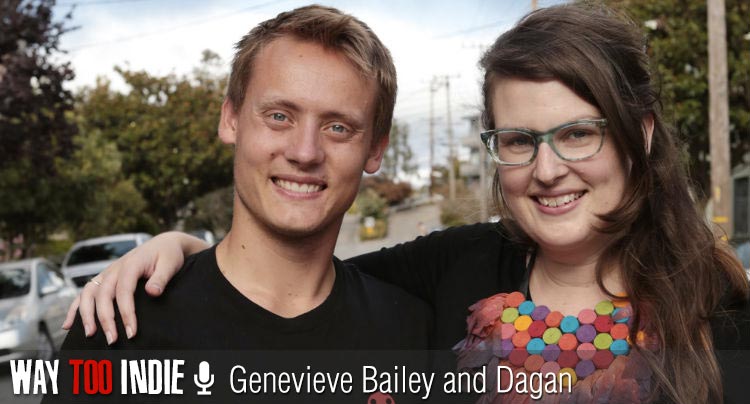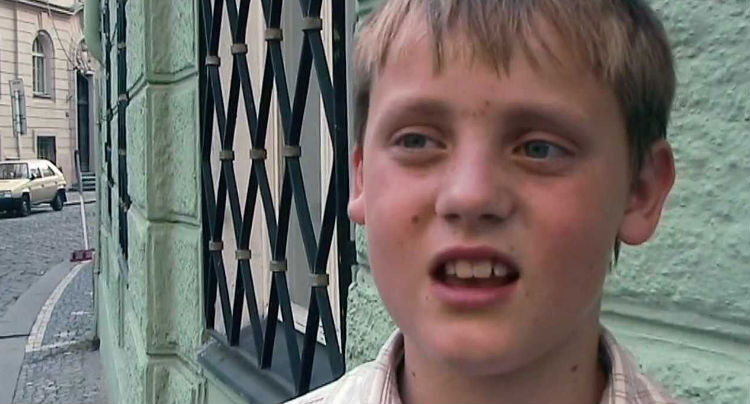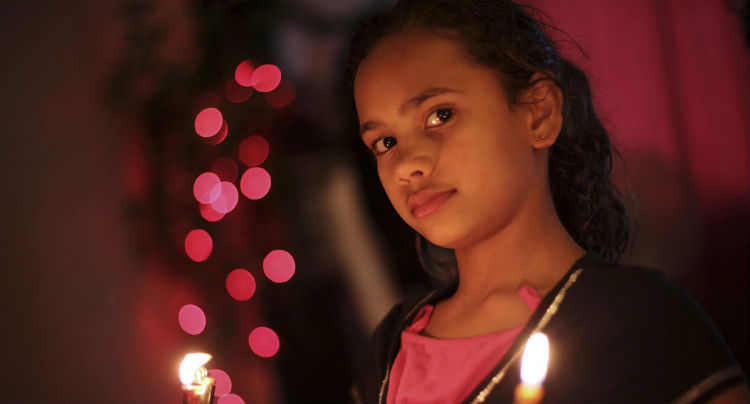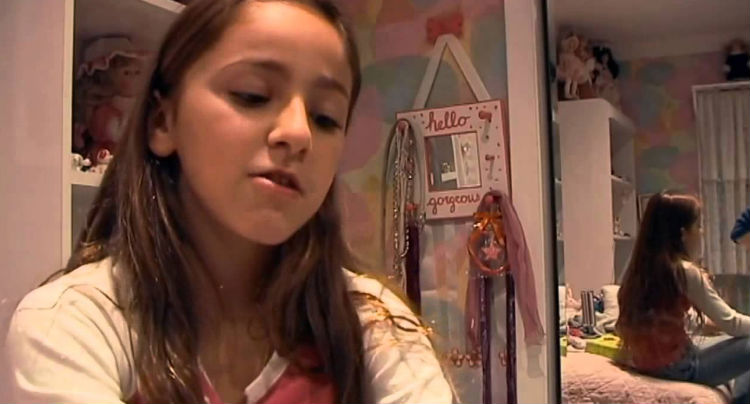Genevieve Bailey On ‘I Am Eleven’ and the Magic of Naiveté

After losing her father and getting injured in a serious car accident, Genevieve Bailey was in a serious rut, and needed to do something to lift her spirits. She remembered that being eleven was the best year of her life, and decided to make a film about it. I Am Eleven isn’t about her experience at eleven, but about about the experiences and perspectives of 22 11-year-olds from across the globe. She visited 15 countries and probed the minds of her young subjects, asking them about love, war, the environment, and racism, among other things. The result is a fascinating collage of what life is like at an age when we’re old enough to form complex thoughts, but not old enough for teenage hormones to muck them up. There’s a purity to the age of eleven, and Genevieve captures it beautifully.
In San Francisco, I caught up with Genevieve and one of the kids from the film, Dagan, who is now 20 and going to school at UC Davis, about the film, which he had not yet seen. Much to my surprise, I was met by a tall young man standing in front of me after watching him 9 years younger just hours before. To my delight I discovered that that day had been the first time Genevieve had seen Dagan since she filmed him almost a decade prior. It was a special occasion for a special film.
In our conversation, we talk about whether making the film was cathartic for Genevieve or not, Dagan’s first impressions of Genevieve, encouraging parents to interview their kids, the film’s re-watchability, Dagan’s expectations of the film, the magical properties of different ages, and much more.
I Am Eleven is playing in select cities and opens in the Bay Area this weekend, where Genevieve will be participating in Q&A’s at AMC Metreon in San Francisco and at the Smith Rafael Film Center in San Rafael. For complete listings and more information, visit iameleven.com

Are you guys having fun on this press tour?
Genevieve: Yeah. I’m super stoked to have found Dagan and to be in the same room after a long time.
Dagan: It’s been exhausting! I’m ready to take a nap! [laughs] I’m lost in it, man!
Genevieve, on the list of best life decisions, where does making this movie rank?
Genevieve: It’s at the top. I’m so glad that I took the risk. I think it was really because I’m a giant 11-year-old. People said the idea was crazy, but it [was amazing]. It’s been a lot of hard work, but it was so insightful and such an amazing learning experience.
Was making the film as cathartic as you thought it was going to be?
Genevieve: It was. I often say that 50% is making the film and 50% is making sure people see it. I certainly found it cathartic, but I didn’t make this film for that to be enough. I really wanted it to reach audiences and to share these kids with the world. To me, the film wouldn’t be finished until it was being received by people.
A lot of people travel the world and get to know cultures through food, art, and/or locals, but the locals are usually adults. I don’t think anyone has ever learned about cultures by interviewing 11-year-olds!
Genevieve: A lot of Australians have a reputation for traveling. When you’re from Australia, you don’t go somewhere for six days–you go somewhere for six months. I didn’t want to hang out with other backpackers or tourists. I really wanted to immerse myself in cultures. I had never left the country before, so I thought it would be a great idea to find 11-year-olds to explore the world with. It’s this whole idea of experiential travel, rather than just ticking off [tourist attractions]. I’ve been to India about six times now, and people say, “Have you seen the Taj?” Nope. I don’t tick off the spots, because the spots will be there forever. I can see them another time. My mission was, “I’m not leaving anywhere until I interview an 11-year-old.”
I was very strict with these three rules. First, the kids had to be eleven. Some parents would say, “He’s twelve, but he’s very short, so no one will know,” but that wouldn’t work. The kids had to want to be in the film, and their parents had to give permission. Other than that, I was open to any kids. I didn’t audition anyone, and they didn’t have to be articulate or charming, they just were, and that’s what 11-year-olds are: They’re awesome! [laughs]
Dagan, I don’t remember anything from when I was eleven. Is the memory of Genevieve filming you a little hazy in your head?
Dagan: It is a little hazy. I’ve got little brothers–one’s eleven and one’s thirteen–so I’ve got this constant reminder. Whenever I interact with my little siblings I remember thinking that way. I remember how I saw the world. I remember that I didn’t see myself as a little kid; I saw myself as a person.
Genevieve: That was very obvious to me when I met Dagan, actually. We had such a short period of time together. Dagan made reference to “George”, and he was talking about George Bush. I loved how you were referring to him in first name only. I remember the conviction in his words. He was the first kid that I shot–I shot him in 2005, and I shot around the world for the next six years. I saw the clarity and conviction in even the shy kids and the introverted kids. Goh from Thailand wasn’t the most chatty kid, but when he talked about the elephants you could see his passion for them.
Dagan: I’ve talked to my little sister, who’s 5-years-old, about God and truth, and it was amazing. I said, “How do you know if something’s true?” Her dad has her go to church every Sunday, and I’m not necessarily a very religious person, and I just wanted to make sure my sister wasn’t being brainwashed or something. We’re walking on the beach, and she sits down and starts drawing in the sand. She says, “This is where I am. This is my group of people. If somebody tells me that there are no stars out there, I know that’s not true because I can see them.” Children are amazing.
Genevieve: The reason I met Dagan is because my friend John, a musician from Australia I made a film about twelve years ago, was going to be in Prague, so I went to Prague. He was playing guitar. Dagan’s parents came up to him and started talking to him about his guitar, and I noticed they had a kid with them. I asked, “How old is he?” Years later, John said to me, “Why would I want to watch a film about 11-year-olds?” When he came to the world premiere, he said, “That’s the best film I’ve ever seen.” It reminded him of when he was eleven, and also his kids and his grandkids who are going to be eleven. The film connects people on a lot of different levels.

I can remember when I was a kid, running around my grandma’s house, there was this wooden banister. I still go to that house today, and when I look at the banister, it looks completely different. It’s like I’m in an entirely separate world than when I was a kid. Dagan, what does the world look like to you now compared to when you were eleven?
Dagan: I had a very dark vision of the world. I totally hear that banister thing. I go back to visit my grandparents, and there are definitely symbols within the objective world that I can see, and it’s a link to the past. I remember how I saw it then, and I see it now, and it has this different context.
It’s a little strange.
Dagan: Yeah, it’s strange.
Genevieve: It’s common now for kids to have cameras. They grow up in this digital age where they have so many photos of themselves. But not many people have interviews where they’re asked about global issues, which is why I’ve been emphasizing to audiences in the U.S. to document their own stories. Point your camera at yourself and interview yourself in your bedroom. You can share that with your family or keep it to yourself, and when you’re 30, 40, 50, you can look back in time. It goes so quickly. To have footage that documents what matters to you right now is a valuable thing to keep.
The film’s incredibly re-watchable. It’s so dense with these wonderful things the kids say. Remi and Billy just blow my mind. Do you notice different things as you re-watch the film?
Genevieve: My mom’s seen the film, like, 31 times in the cinema. I tell her she doesn’t have to see it that many times, but she keeps finding people she hasn’t seen in years and showing it to them! [laughs] She says she sees something different every time. Someone who saw the film in L.A. last week said that two of the kids have the same curtains, in different countries. I’ve never noticed that, and I made the film! I like that I’ve made a film that’s re-watchable. When the DVD comes out, we’ll have a lot of special features where you’ll see the kids when they’re a lot older, Q&A’s from around the world with the kids talking…I love the idea that, in 100 years, people can watch this film and see what it was like to be growing up today.
The film is quite the gift for all of the kids.
Genevieve: We have to wait and see if Dagan likes it! [laughs]
Dagan: I’m expecting to be in it for, like, five minutes. [laughs]
You make quite the impact, though.
Genevieve: I only had a little bit of footage with Dagan. I didn’t have anything of him at home, with his family, or doing his hobbies, but when I was editing, I realized it didn’t matter. As you say, what he says packs a punch.
The camera is at the kids’ height for almost the entire film.
Genevieve: I focus on looking at people and not down on them. I have a bad back from the car accident, but I would just hunch down with the kids and try to keep the camera at eye level.
Dagan: That’s funny, because just as you said that, I remember you getting low when we were doing the interview, and I was thinking, “What is this person up to?! First, she takes me away from my parents…” [laughs]
Dagan, you’ve heard a lot about the film, but you haven’t seen it. What are you expecting?
Dagan: I’m expecting to be blown away. I’m ready to be amazed. I’m excited. I don’t want to put the film on a pedestal, but I think it deserves to be there.
Genevieve: It’s always a blast when I get to sit next to someone who’s in the film and watch the film with them. It’s quite an emotional experience. I’m so proud of them, and when the kids watch the film, I hope they like it. I’m so happy that all the kids that have seen it so far have really embraced it.
I think it’s an emotional experience to watch home videos of yourself at a young age.
Genevieve: My mom used to shoot super 8 footage of us and project it on a sheet. I loved seeing my parents when they were younger, seeing my dad wear knee-high socks on his honeymoon, running after chickens. When I see myself as a child, I look at it like it’s this girl I know. I know it’s me, but I also feel like I know her really well.
You see a lot of home videos of birthday parties and stuff like that, but hopefully your film will inspire people to ask deeper questions of their kids.
Genevieve: Someone asked me in L.A. if I had my list of questions online so that kids can download them and ask themselves. That’s a really good idea, so we want to expand this I Am Eleven community. What I thought would be great would be to do a podcast. Every month I would announce a theme, like the environment, spirituality, war, love. I love the idea of 11-year-olds or anybody else coming monthly for new content. I’m not sick of the 11-year-old thing. If I chose to make a film about horrible people, it would be hard to have the enthusiasm.
I imagine you had to come up with your questions for the kids way in advance.
Genevieve: Not every child will have something to say about every theme. So even though Dagan had stuff to say about the environment, some kids didn’t have as much to say. Maybe they had a lot to say about war or school. I had enough themes so that they’d be able to speak to the ones that meant most to them. Editing the film was a huge job. I did it myself.
Congratulations!
Genevieve: Thank you! One of Australia’s most revered editors wanted to get onboard the project, but I just couldn’t afford him.
You didn’t need him. I thought you did a great job.
Genevieve: Thank you. The press in Australia are very hard on films made by Australians. They can be very critical. I would say one of the only negative points critics have mentioned is that they wanted to see more of him or her, or this storyline, or that there were too many kids. I think, if that’s the worst criticism we get, that’s pretty awesome, because it means they like the kids and want to see more of them. It was a conscious decision to not make it just about three or four kids. Someone once said to me, “People in the U.S. don’t like reading subtitles. Maybe if you just have English speaking kids, you can cut out the rest of them.” I had someone else say, “Maybe if you only had three or four kids, you can have more footage of them.” Of course, that would be true, but I wanted to show a portrait of childhood, and that includes diversity. I made these decisions consciously, and there were risks involved, but I think Jack at the end of the film sums it up really well: “You don’t have to do what everyone else does.” I think I was empowered by that.
If I’m being honest, Dagan, I was expecting you to be a little kid when I met you today. [laughs] I was going to ask you what age you were looking forward to next. Are you excited to be 21? You’re attending Davis, so you’re already living the 21-year-old lifestyle, right?
Dagan: I don’t have access to the bars right now, and all my buddies…that’s the scene that happens in Davis for some reason. 21 is an age I’m looking forward to.

This is a little odd for me, because I watched the film last night and saw you at 11-years-old, and to see you sitting in front of me at 20 is really weird. [laughs]
Dagan: It’s like Boyhood-light! [laughs]
Genevieve: You press who are interviewing today are the first people in the world to meet him after seeing the movie.
What was your first impression of Genevieve?
Dagan: At first it was uncertainty, and her [getting down low to film] had something to do with it…
Genevieve: I can’t believe you remember that.
Dagan: I just remember that being a funny thing. A couple minutes into it, I felt like I could open up and talk to this person. She was actually interested in what I had to say, which was weird, but I was like, “Let’s go!” That’s the magic of Genevieve, and that’s how she was able to make this film and have these kids open up. I don’t know exactly how you did it, but you did it!
Genevieve: It’s so special to hear you say that, Dagan, because I feel like if I’m being interviewed or photographed and I don’t feel comfortable…[trails off]. I had some photos taken for press in Australia, and I remember not feeling comfortable at the time. When I saw them, I thought, “I don’t look like me!” I think people should feel comfortable when they’re being interviewed. My next film is a very deeply personal film, and the people in it are sharing so much of themselves that I’m so glad that they’re really comfortable. They’re talking about really personal issues.
You’ve got a lot on your plate.
Genevieve: That’s the thing: People always say, “What’s next?” Well, I’m juggling eight days a week of I Am Eleven, and then this new film is Happy Sad Man. The name just came to me. I think titles are really interesting. Proud Mother Pictures is our company name; It’s easy to remember, it’s kind of provocative, and it reflects that our films are like our babies. I think you want [the names] to speak to people, and I Am Eleven speaks to people. I was standing outside this theater with Henrik, and this couple ran across the road saying, “I Am Eleven! I Am Eleven! We’ve got to see it!” New Yorkers are so, you know, “big”. Henrik and I were like, “Are we being punked?” I said to them, “Guess what? I made that film! Have you heard of it?” They were like, “No, we just saw the poster.”
Eleven is kind of a magical age, just before kids become jerky teenagers. Do you ever think about the magical properties of other ages?
Genevieve: I nearly did I Am Four. I’m glad I chose eleven. A psychiatrist came up to me [at our opening in Australia] and said, “You should do I Am Four. I’m a psychiatrist, and it’s a fascinating age.” He’s become a big fan of the film, and he was at a conference I spoke to for international child psychologists. It was fascinating to screen the film to a room full of child psychiatrists. Their feedback was amazing. The majority of them just put their hands up and said thanks for making the film. One of them said, “Did you talk to any child psychiatrists [before you made the movie]?” I said no. He said, “Good. The film is better because you didn’t go in there with all this academic information.” There’s a naiveté to the film. There’s a magic to that age because there’s a naiveté to that age, and it’s before the teenage hormones come and make life more complicated.
A lot of the things the kids say in the film are definitely naive, but they’re brilliant in a way, too. Kim, the girl from Jersey, has a prediction about how she’s going to meet the love of her life in college.
Genevieve: She says, “He’ll say ‘Oh my gosh, I love your hair!’ and I’ll say, ‘Oh my gosh, I love your shoes!’ and he’ll say, ‘Oh my god, you are so beautiful!’ and I’ll say, ‘Oh my god, you’re so hot!'” When she said that, I had to close my mouth to not make any noise. So good! When she went to orientation for college, the first person she saw was this boy named Andrew, who she had a crush on when she was eleven. Following up with the kids is a blast.
